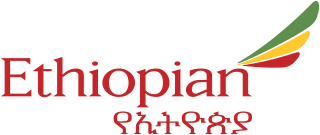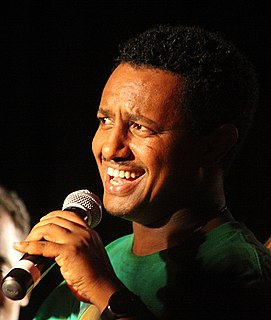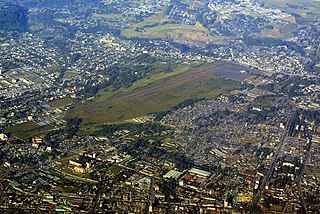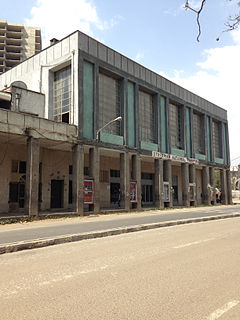Telecommunications in Ethiopia is a monopoly in the control of Ethio telecom, formerly the Ethiopian Telecommunications Corporation (ETC). As of 2012, 20.524 million cellular phones and 797,500 main line phones were in use.

Addis Ababa, also known by its unofficial name Finfinne, is the capital and largest city of Ethiopia. It also serves as the regional capital of Oromia. In the 2007 census, the city's population was estimated to be 2,739,551 inhabitants. Addis Ababa is a highly developed and important cultural, artistic, and financial centre of Ethiopia.

Ethiopian Airlines, formerly Ethiopian Air Lines (EAL), is Ethiopia's flag carrier and is wholly owned by the country's government. EAL was founded on 21 December 1945 and commenced operations on 8 April 1946, expanding to international flights in 1951. The firm became a share company in 1965 and changed its name from Ethiopian Air Lines to Ethiopian Airlines.

Addis Ababa Bole International Airport is an international airport in Addis Ababa, Ethiopia. It is located in the Bole district, 6 km (3.7 mi) southeast of the city centre and 65 km (40 mi) north of Bishoftu. The airport was formerly known as Haile Selassie I International Airport. It is the main hub of Ethiopian Airlines, the national airline that serves destinations in Ethiopia and throughout the African continent, as well as nonstop service to Asia, Europe, North America and South America. The airport is also the base of the Ethiopian Aviation Academy. As of June 2018, nearly 750 flights per day were departing from and arriving at the airport.
Ejigayehu Shibabaw, known by her stage name Gigi, is an Ethiopian singer. She has performed the music of Ethiopia in combination with a wide variety of other genres, often in collaboration with her husband Bill Laswell, a bassist and producer.

Tewodros Kassahun Germamo, known professionally as Teddy Afro, is an Ethiopian singer-songwriter. Known by his revolutionary songs and political dissent sentiment, Teddy is considered one of the most significant Ethiopian artists of all time. Teddy has had a huge cultural impact on the Ethiopian music industry and has been a big influence on many young artists.

Saint George Sports Club, otherwise known as Kidus Giorgis, is a professional football club based in Addis Ababa, Ethiopia. They play in the top division of Ethiopian football, the Ethiopian Premier League. Founded in 1935, the club was the first in Ethiopia and was established as a symbol of Ethiopian nationalism and resistance against the occupying forces of fascist Italy.

Abatte Barihun is an Israeli jazz saxophonist and composer. His sound is reminiscent of John Coltrane's, who has highly influenced Barihun.
Holeta is a town located in the special zone of Oromia Regional State. It has a latitude and longitude of 9°3′N38°30′E and an altitude of 2391 meters above sea level.

The Ethio-Djibouti Railway is a metre gauge railway in the Horn of Africa that once connected Addis Ababa to the port city of Djibouti. The operating company was also known as the Ethio-Djibouti Railways. The railway was built in 1894–1917 to connect the Ethiopian capital city to French Somaliland. During early operations, it provided landlocked Ethiopia with its only access to the sea. After World War II, the railway progressively fell into a state of disrepair due to competition from road transport.

Dembel City Center, also known as Dembel Mall is a shopping center in Addis Ababa. Located in the center of the city less than 3 mi (4.8 km) from Bole International Airport, it was one of the first Western-style shopping malls in Ethiopia. Built in 2002, the twelve-floor structure has 123 spaces for shops and offices. It currently has about 105 shops, restaurants and galleries.
The Siltʼe people are an ethnic group in southern Ethiopia. They inhabit the Siltʼe Zone which is part of the Southern Nations, Nationalities and Peoples Region. Siltʼe denote their origin to the city of Harar.

Tigist Shibabaw was an Ethiopian singer and one of the original members of the Harlem-based hip hop fusion band Bole2Harlem. She was born in Chagni, Ethiopia, like her sister, the singer Gigi.

Lideta Airport also colloquially known as the Old Airport is a decommissioned military airport located in Addis Ababa, Ethiopia.
The following is a historical events of Addis Ababa, the capital of Ethiopia, including its formation prior to 20th century by chronology.

The Addis Ababa Light Rail is a light rail system in Addis Ababa, Ethiopia. It is the first light rail and rapid transit in eastern and sub-saharan Africa.

The Cinema of Ethiopia and the film industry in general is a relatively recent phenomenon in Ethiopia. The Ethiopian film industry is growing, but faces many problems that have prevented it from fully flourishing. Historically live stage theater enjoyed more popularity in Ethiopia, creating a handful of relatively successful stage actors. Ethiopian films began modernizing since 2000s, implementing Amharic language, but due to wide home video and DVD distribution, it often frustrated by copyright infringement in presence of piracy. This was reduced in early 2010s with an intervention of government and imposition of policy. Despite recently developing, the Ethiopian film production continued to be lack of complement quality in relation to world premiere with low budget amateurish style.

Jano Band is an Ethiopian rock band formed by its entrepreneurs Ermyas Amelga and former manager Addis Gessesse in 2011. It versatilely mixes progressive rock with Ethiopian music. The band includes two female back and lead vocalists, two lead male vocalists, and four musicians who play bass guitar, rhythm guitar, drum, and keyboards.
The Skunder Boghossian College of Performing and Visual Arts is the umbrella organization for Ethiopia's oldest secular schools for the arts, offering Bachelors and Masters programs in art, theater, and music.

Elias Melka Geresu was an Ethiopian record producer and songwriter. Elias became popular after successfully composing Teddy Afro's debut album Abugida, which was released in 2001. Elias has composed more than forty studio albums and has worked with many and the most inflectional singers in modern Ethiopian music history. Until his death on 4 October 2019, he had played a crucial role in the Ethiopian music industry.














